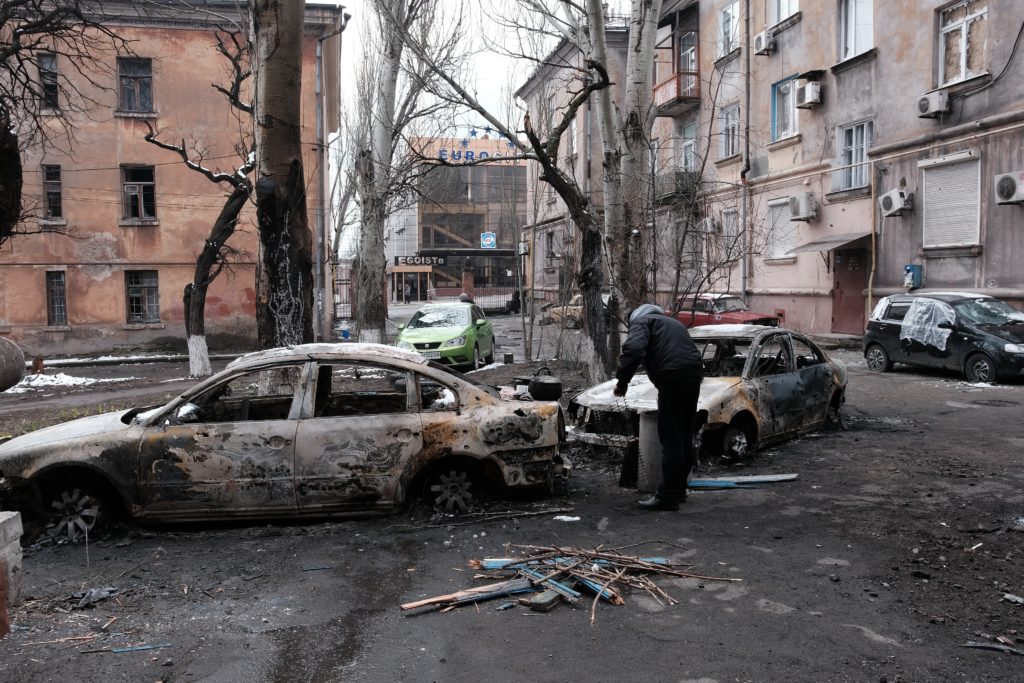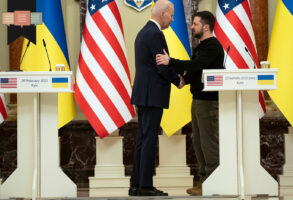
Published March 20, 2022
Following the Russian invasion of Ukraine, it has been hard to resist the lust for justice. Putin’s brutal tactics, along with the pathos of his victims and the courage of Ukrainian resistance, all shared online in real time, induce wrath and a desire to set things right. And it is right to be angry at evil and to desire that justice be done to the wicked.
But the demand for justice must be tempered with prudence and humility, as well as mercy. Let justice be done though the heavens fall? Against a nuclear-armed adversary, the heavens might really fall, with the power of the stars exploding over cities. Though justice may demand that Putin be hanged for war crimes, he is untouchable so long as he controls Russia’s nuclear arsenal.
And so we are left yearning for judgment that is only available through apocalypse. We want the wicked to receive the penalty for their sins and for those who mourn to be comforted. But, contrary to the hawks who imagine the US can impose its will on the world in general and Russia in particular, we are stymied in administering justice on earth. As for divine justice, our culture, at most, half-believes in judgment in a world to come.
Thus, it seems that Putin will get away with it. If peace is made, as we should hope it soon will be—not just for the sake of the combatant nations, but also for those around the world who depend on their grain exports—it will be a peace inclusive of injustice. Putin will achieve some of the ends of his unjust war, though they may have cost more than he expected. But these burdens are not being born by him, but by ordinary Russians who are being impoverished by sanctions and whose sons are dying. The tyrant himself is untouched, and free to enjoy an assortment of pleasures.
In response to this realization we might turn to philosophy, which at its birth addressed the problem of apparently triumphant injustice. Plato provided a portrait of the tyrant as the most wretched of men, for he is enslaved by passions and constantly mutilating his own soul with his wickedness. It seems likely that Putin has made himself incapable of happiness.
Yet that does not seem sufficient. When we consider the misery Putin has inflicted, is it enough that he may not be truly happy? Indeed, even the justice meted out by his defeat, arrest, trial and execution would be insufficient (assuming it were even possible). Sentencing Putin to dance the hemp fandango will not mend the rent bodies of children killed by Russian artillery, nor could years of torture could equal the anguish he has inflicted.
Thus, though we may not believe in it, we nonetheless long for divine apocalypse, with righteousness cleansing the world of its wickedness. Indeed, Plato, despite his arguments for the misery of tyrants, also created myths of rewards and punishments in the afterlife, with the wickedest sentenced to perpetual torment. We desire justice—so long as it is limited. In heaven as on earth, justice comes with risks; we want the war criminals punished, but do not want to be judged ourselves, for though our sins may be lesser, they still keep us far from holiness.
Consequently, we cannot be excluded from a world under judgment, either individually or nationally or culturally. That it is easy to condemn Russia does not mean that critiques of the West do not bite in their turn. Putin’s war is wicked—and the West is decadent. We should be able to recognize that America, as well as our adversaries and rivals, is under judgment.
Acknowledging the universal reality of evil in human hearts does not necessitate moral equivalence or relativism. Rather, understanding it restrains the desire for an apocalypse that applies only to our enemies. Acknowledging our sins, individually and corporately, may thereby encourage us to necessary reforms in our own spheres of life and culture. It will also enable the pursuit of genuine morality in international affairs, an effort that must begin by rightly understanding human finitude and fallibility. It is sometimes necessary to fight, but force of arms cannot eradicate the seed of evil from the hearts of men.
The vision of a military victory that will “make the world safe for democracy” or “end all wars” or even bring “an end to evil” is just a secularized eschaton; an illusion of a one-sided apocalypse. Such dreams are dangerous. At best they are diversions from the prudential practice of statesmanship, at worst they encourage self-righteous military recklessness that prevents peace.
The longing for justice should direct us in humility toward God, rather than to earthly schemes for apocalypse now.
Nathanael Blake, PhD, is a Postdoctoral Fellow at the Ethics and Public Policy Center. His primary research interests are American political theory, Christian political thought, and the intersection of natural law and philosophical hermeneutics. His published scholarship has focused on Jean-Jacques Rousseau, Hans-Georg Gadamer, Alasdair MacIntyre and Russell Kirk. He is currently working on a study of J.R.R. Tolkien’s anti-rationalism. He writes from Virginia.
Nathanael Blake, Ph.D. is a Postdoctoral Fellow at the Ethics and Public Policy Center. His primary research interests are American political theory, Christian political thought, and the intersection of natural law and philosophical hermeneutics. His published scholarship has included work on Jean-Jacques Rousseau, Hans-Georg Gadamer, Alasdair MacIntyre, Russell Kirk and J.R.R. Tolkien. He is currently working on a study of Kierkegaard and labor. As a cultural observer and commentator, he is also fascinated at how our secularizing culture develops substitutes for the loss of religious symbols, meaning and order.





